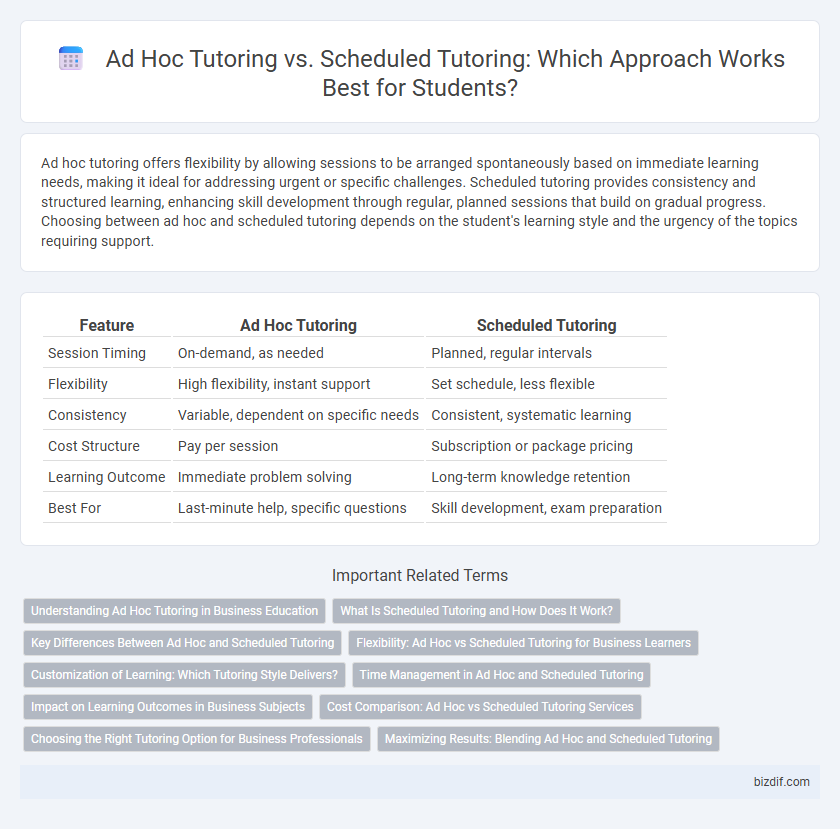Ad hoc tutoring offers flexibility by allowing sessions to be arranged spontaneously based on immediate learning needs, making it ideal for addressing urgent or specific challenges. Scheduled tutoring provides consistency and structured learning, enhancing skill development through regular, planned sessions that build on gradual progress. Choosing between ad hoc and scheduled tutoring depends on the student's learning style and the urgency of the topics requiring support.
Table of Comparison
| Feature | Ad Hoc Tutoring | Scheduled Tutoring |
|---|---|---|
| Session Timing | On-demand, as needed | Planned, regular intervals |
| Flexibility | High flexibility, instant support | Set schedule, less flexible |
| Consistency | Variable, dependent on specific needs | Consistent, systematic learning |
| Cost Structure | Pay per session | Subscription or package pricing |
| Learning Outcome | Immediate problem solving | Long-term knowledge retention |
| Best For | Last-minute help, specific questions | Skill development, exam preparation |
Understanding Ad Hoc Tutoring in Business Education
Ad hoc tutoring in business education involves spontaneous, needs-based sessions that address specific topics or immediate challenges faced by students, offering flexible and targeted support. This approach allows learners to seek help exactly when problems arise, enhancing comprehension and practical application of complex business concepts. Unlike scheduled tutoring, ad hoc sessions adapt to real-time demands, fostering personalized learning and quicker problem resolution.
What Is Scheduled Tutoring and How Does It Work?
Scheduled tutoring involves regular, pre-planned sessions that occur at consistent times, ensuring structured learning and steady academic progress. This approach allows tutors to create tailored lesson plans based on the student's ongoing needs and track improvement over time. By maintaining a routine, scheduled tutoring enhances accountability and fosters a disciplined study habit for better knowledge retention.
Key Differences Between Ad Hoc and Scheduled Tutoring
Ad hoc tutoring offers flexibility by providing sessions on demand without a fixed timetable, ideal for addressing immediate learning gaps or last-minute exam preparation. Scheduled tutoring involves pre-planned, regular lessons that foster consistent progress and structured learning over time. The key differences lie in availability, consistency, and planning, with ad hoc tutoring emphasizing spontaneity and scheduled tutoring prioritizing routine and long-term educational goals.
Flexibility: Ad Hoc vs Scheduled Tutoring for Business Learners
Ad hoc tutoring offers unparalleled flexibility for business learners by allowing sessions to be arranged spontaneously, catering to immediate and specific learning needs. Scheduled tutoring provides consistency and structured progression, essential for mastering complex business concepts over time. Balancing ad hoc and scheduled tutoring enables business professionals to optimize their learning paths by addressing urgent challenges while maintaining steady skill development.
Customization of Learning: Which Tutoring Style Delivers?
Ad hoc tutoring offers personalized learning tailored to immediate student needs, adapting quickly to specific questions or challenges. Scheduled tutoring provides a structured environment that allows for consistent progress tracking and deep skill-building over time. Combining flexibility with systematic planning, scheduled tutoring often delivers more comprehensive customization through consistent assessment and goal adjustment.
Time Management in Ad Hoc and Scheduled Tutoring
Ad hoc tutoring offers flexibility by allowing students to seek help exactly when needed, optimizing immediate time management but sometimes lacking consistency. Scheduled tutoring ensures regular, planned sessions that help establish a structured routine, enhancing long-term time management and academic discipline. Both methods cater to different time management needs, with ad hoc tutoring suited for urgent academic support and scheduled tutoring promoting steady progress.
Impact on Learning Outcomes in Business Subjects
Ad hoc tutoring in business subjects allows students to address specific challenges immediately, enhancing comprehension of complex concepts like financial analysis or marketing strategies. Scheduled tutoring promotes consistent study habits and deeper mastery by reinforcing key topics such as accounting principles or business law over time. Research indicates combining both methods results in improved learning outcomes, with immediate problem-solving support and sustained academic growth in business education.
Cost Comparison: Ad Hoc vs Scheduled Tutoring Services
Ad hoc tutoring typically incurs higher hourly rates due to its flexible, on-demand nature, whereas scheduled tutoring offers lower costs per session through pre-arranged commitments and package deals. Scheduled tutoring often results in better long-term financial savings for students requiring consistent academic support, as providers may offer discounts or bulk session pricing. Cost efficiency depends on the frequency and predictability of tutoring needs, making scheduled sessions ideal for ongoing assistance and ad hoc sessions suitable for occasional or emergency help.
Choosing the Right Tutoring Option for Business Professionals
Ad hoc tutoring offers flexibility for business professionals needing immediate, topic-specific assistance, while scheduled tutoring provides consistent support for long-term skill development. Choosing between these options depends on the individual's learning goals, availability, and the complexity of the subject matter. Business professionals benefit most from a blended approach, combining ad hoc sessions for urgent needs with scheduled tutoring for structured progress.
Maximizing Results: Blending Ad Hoc and Scheduled Tutoring
Blending ad hoc tutoring with scheduled sessions maximizes student outcomes by providing both flexibility and consistent support tailored to individual needs. Ad hoc tutoring addresses immediate questions and learning gaps, while scheduled tutoring ensures structured progression and skill reinforcement. Combining these methods enhances engagement, accelerates comprehension, and drives sustained academic improvement.
Ad Hoc Tutoring vs Scheduled Tutoring Infographic

 bizdif.com
bizdif.com